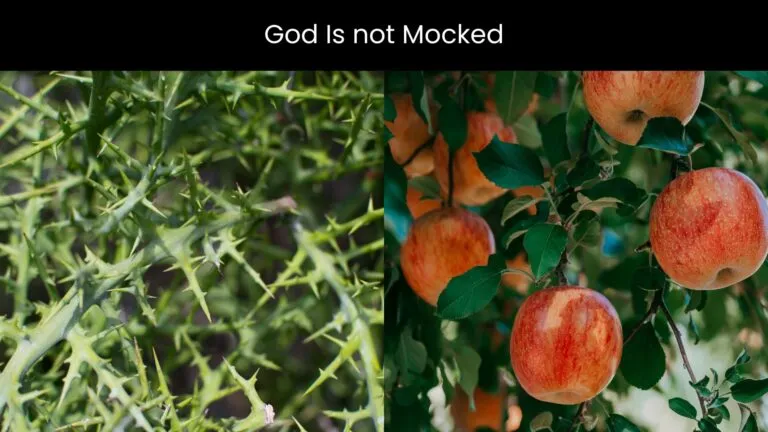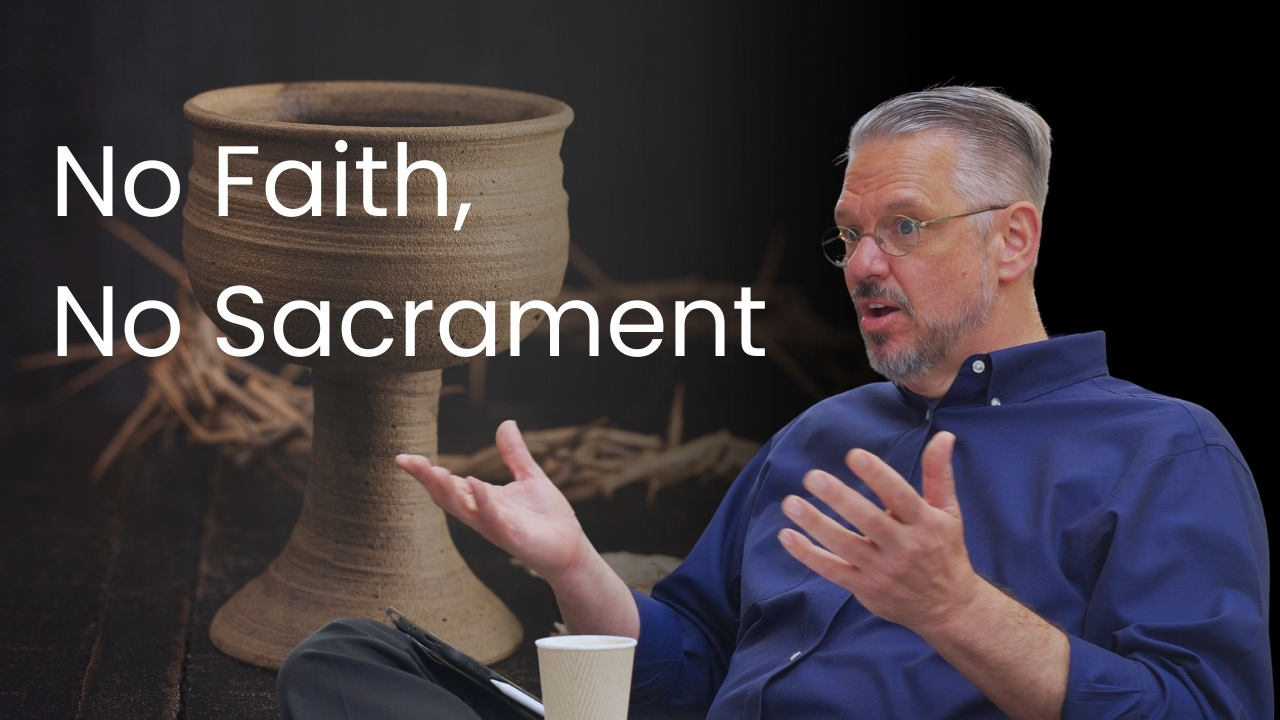God Is not Mocked
Our God delights to pardon. He does not want any to die but wants all to come to repentance. The prophet Jonah knew this so well he gave it as his excuse for not preaching to Nineveh: he was scared the people would repent and God would relent from his proclamation of destruction. Our God delights to save. He brought Israel out of slavery. He routed Midian before Gideon. He sent his Son to seek and to save the lost. Believers share in the death and resurrection of Jesus. We also share in Jesus’ acceptance with the Father and in his rule over the principalities and powers.
The Apostle Paul states briskly: “Do not be deceived, God is not mocked; for whatever a person sows, this he will also reap.” (Galatians 6:7)1. Sometimes we struggle to see how this “law of sowing and reaping” fits together with that fact that God delights to pardon and save and that he wants to keep us from reaping the harvest of our sin. I explored that question in a previous essay, “Rebirth and the Law of Sowing and Reaping,” and in a companion podcast.2
God is not mocked. How are we tempted to mock God? We may think of people who openly make fun of God with their words. But the mockery I have in mind is that of a twisted response to God’s readiness to pardon and to save. It is the mocking presumption that we can be assured of God’s acceptance and of sharing the inheritance of his Son in the life to come, all the while opting out of God’s plan to save us from the actual grip of sin in our lives.
What is sin? Why do we need to be saved from it? On the one hand, sin is an offense against God, and we need to be reconciled to God. We have wronged God and must be forgiven and brought back to fellowship with him. On the other hand, sin is intrinsically destructive. Wrongdoing degrades us as people; we lose integrity. Ultimately, we lose purpose, and we lose the ability to make choices and decisions freely as we are a slave to what we feel like and what we want. Scripture tells us that death is the natural outgrowth of sin. More should be said, but these points suffice for the current purpose.
God’s pardoning and saving activity addresses both points. God brings us from wrath and condemnation to forgiveness and acceptance. He also interrupts the corruption that is working death in us. He puts his life in us and raises us with Jesus. Righteousness and goodness begin to grow in our lives. In short, he saves us from the actual grasp of sin.
Why are we tempted to mock God? Sometimes it comes from misunderstanding certain truths. We know that God’s pardon is not based on us being able to make up for our sin but is instead based on God’s gracious gift. We know that we can’t make ourselves alive. We know that even those alive in Christ are not entirely free of sin. These things are true, but they do not mean that actual continued sin is irrelevant to our pardon and salvation.
The temptation to mock God comes from the sin that remains in us. It comes from our desires for wrong, from our pride, from our laziness. The regenerating power of God in our lives calls for participation. We are baptized into the death of Christ and crucified with him. God calls us to ongoingly crucify the flesh and what it wants. We have been brought into Christ. We are called to put off the old human that lies, fights, lazes, envies, and defiles and to put on the new human. In our new identity with Christ, we love, care, persevere, and make peace. There is a war within us between old and new: our sin and our habits resist God’s transformation.
False theology peddles the lie that we can opt out of God’s work of saving us from the actual grip of sin in our lives, but still lay claim to God’s pardon and reconciliation and to the full inheritance of the Kingdom in the life of the world to come. Such theologies tell us that deliberate acts of sin and neglect of character development are not ultimate dangers to our status as children of God. Perhaps we will lose out on the blessing of fellowship with God in this life, perhaps we will even end up with fewer rewards in the life to come, but as long as we have appropriately entered the kingdom, we are guaranteed that Jesus will recognize us at the final judgement, no matter how we live. These theologies of false assurance can employ statements about the relationship of faith and works, about God’s keeping power, or about human weakness that sound correct on the surface but are less than clearsighted about the realities of life with God. Scripture calls such theologies “empty words.” “For this you know with certainty, that no sexually immoral or impure or greedy person, which amounts to an idolater, has an inheritance in the kingdom of Christ and God. See that no one deceives you with empty words, for because of these things the wrath of God comes upon the sons of disobedience.” (Ephesians 5:5-6).
Let me be clear. I am not suggesting we should question our status with God simply because we have sin in our lives or because we find ourselves often failing. “If we say we have no sin, we deceive ourselves” (1 John 1:8). Across the New Testament scriptures, we find that the fight between spirit and flesh, between the old human and the new human, is ongoing; the full redemption of our bodies is still in the future. Confessing our sins and seeking God’s help is something we will continually do as his dear children. “[W]e do not have a high priest who cannot sympathize with our weaknesses” (Hebrews 4:15)
God is for us; God is with is; he is working in our weakness and brokenness. The scripture is full of reassurance. But nowhere are we promised that we can simply give up the fight and God will make sure everything turns out okay. Nowhere are we told we can opt out of God’s transformation program and still reap eternal life.
I do not discount the idea that various things might lessen the fellowship believers have with God or even that they might lessen rewards in heaven. We might miss out on God’s best, due to our less-than-full participation, and still be accepted as God’s dear children. What we must reject is the idea that blessings and rewards are the only thing that can be at stake in our fight against sin. That fight must be taken with all seriousness. Sin kills.
To mock God is to think lightly of what he has done for us; it is to reject the giver and try to keep the gift. The statement “God is not mocked; for whatever a person sows, this he will also reap” is found in Galatians 6. Its purpose in the immediate context is to encourage us to persevere in doing good, especially for other believers, because in due season we will reap. In a slightly broader context, this statement follows up on the contrast between the fruit of the Spirit and the works of the flesh in chapter 5. Paul forewarns “that those who practice such things” as idolatry, strife, envy, or sexual immorality “will not inherit the Kingdom of God.” He reminds us that “those who belong to Christ Jesus crucified the flesh with its passions and desires.” (Galatians 5:19-24).
Why is the struggle with sin still a mortal struggle after we have been reconciled with God and given new life by him? Why is it still the case that “the one who sows to his own flesh will reap destruction from the flesh, but the one who sows to the Spirit will reap eternal life from the Spirit”? We might think that God’s rescue of us supersedes the law of sowing and reaping and renders it irrelevant. After all, we are spared the wrath we deserve and given a life we could not produce. But this new life does not mean the law of sowing and reaping goes away. Rather, we are given the opportunity to reap rewards we never could have reaped without God’s intervention in our lives. For more discussion of that see my essay mentioned above on “Rebirth and and the Law of Sowing and Reaping.”3
Romans chapter 6 makes this point crystal clear. Unfortunately, the intended contextual point of Romans 6:23 is often missed. That verse completes Paul’s explanation of why sin in the life of the believer is not inconsequential. Throughout chapter 6, Paul is answering the questions “Are we to continue in sin that grace may increase?” and “Are we to sin because we are not under the Law but under grace?” Paul answers that we have been united to Christ and have died to sin. We are to consider ourselves dead to sin and alive to God and to not allow sin to reign in our bodies. We present our body parts to God as tools for what he wants to do. In case we miss the point, Paul states quite bluntly: “Do you not know that the one to who you present yourselves as slaves for obedience, you are slaves of that same one whom you obey, either of sin resulting in death, or of obedience resulting in righteousness?” God is not mocked, and when sin is our actual master, we are its actual slaves, and the wages that Master Sin pays out to his slaves is death. But when we present ourselves to God for obedience and our body parts as tools of righteousness, God is our actual master, and the gift that Master God graciously gives is eternal life. That is the point of Romans 6:23.
Perhaps what I have articulated feels like a sort of bargaining with God—as if God issued a contract saying that if we meet such and such a standard, or if we obtain a certain level of moral achievement, then he will pardon and save. Perhaps some will worry that I am representing God as requiring some level of minimum performance, or that I am saying that if we do certain things we can obligate God to save us. That is not the correct way to think about these matters. God is a person. God works to reconcile and save us. He is willing and able to bring us through weaknesses and failures and wanderings, and he does not impose limits on that. But there is no bargaining with God; there is no saying “well you saved so and so despite such and such a sin, so I can commit that sin too.” There is no presumption, no outwitting God, no finding loopholes in contracts. We come to the presence of God with faith and surrender, and in Jesus we are transformed from glory to glory.
__________________________________
References
1 Scripture quotations NASB. Return to context⬏
2 Read the article at https://link.anabaptist.media/ial or listen to the podcast at https://link.anabaptist.media/wdw Return to context⬏
3 Read the article at https://link.anabaptist.media/ial Return to context⬏








Leave a Reply